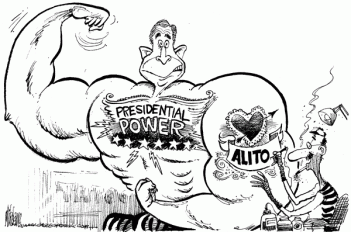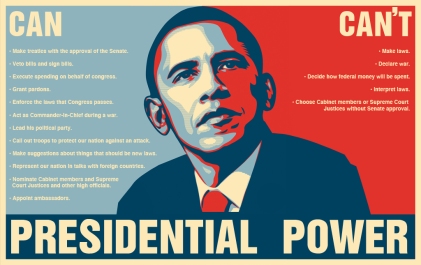Since 1933, when the Twentieth Amendment to the Constitution moved up the date of the President’s inauguration from March 4 to January 20, new Presidents-elect have had about eleven weeks to make the transition from candidate to President. Several important tasks must be accomplished in this period if the transition is to be successful. None is politically more important than appointing the White House staff and the cabinet. None is personally more important than preparing the new President’s family for life in the White House.
Like Franklin D. Roosevelt in 1933 and Ronald Reagan in 1981, Obama had to address a major economic crisis as soon as he was inaugurated on January 20, 2009. The nation’s leading banks and other financial institutions were in serious danger of collapse. The economy had stopped growing and was hemorrhaging jobs, with the unemployment rate nearing 10 percent. Housing prices were in free-fall, leading to numerous foreclosures.

Even before taking the oath of office, Obama had endorsed President George W. Bush’s Troubled Asset Relief Program (TARP), a $700-billion initiative to rescue the nation’s major banks by lending enough money to keep them solvent. As President, Obama also directed some TARP funds to General Motors and Chrysler in an effort to keep the automobile industry from going bankrupt. TARP worked—all the banks and auto companies survived and by the end of 2009 they already had repaid the government more than $600 billion—but many voters perceived the program as a bailout for wealthy bankers and corporate executives.

Obama’s first major recommendation to Congress was for an $800-billion economic stimulus package: the American Recovery and Reinvestment Act. About one-third of the money involved grants to state governments to keep them from laying off public employees or reducing unemployment compensation; about one-third went for bridges, highways, sewage treatment facilities, and other infrastructure projects; and the remaining third was for middle-class tax cuts. Although Obama hoped to pass the Recovery Act with bipartisan support, not a single Republican House member and only three Republican senators voted for it. Democratic control of Congress was strong enough to secure its passage, however, and President Obama signed the act into law on February 17, 2009.
Obama wanted to do more as President than put out fires. He also sought to enact a major reform of the nation’s health care system. Health care reform had been a leading Democratic Party goal since the presidency of Harry S. Truman. In 1965, Lyndon B. Johnson had secured the enactment of Medicare for older Americans and Medicaid for the poor. The next two Democratic Presidents, Jimmy Carter and Bill Clinton, each failed to persuade Congress to pass legislation to guarantee health care coverage for everyone else. Although Obama had only promised during the election campaign to address this issue “by the end of my four-year term,” he decided that his best chance of success was during his first year in office, when his popularity was likely to be at its highest.
Obama faced major hurdles in achieving health care legislation. Although Democrats in Congress were united in support of reform, they were divided about what form it should take, with some insisting that the federal government offer a “public-option” coverage plan and others urging that private coverage be extended to those who lacked it. More than three-fourths of Americans had private health insurance in some form, and despite the steeply rising costs of health care, many of them worried that changing the system might make their own situation worse, as well as adding to the federal budget deficit that the Recovery Act had already sent soaring to more than $1 trillion per year.
In the face of these obstacles, Obama resolved that any reform proposal would have to be budget-neutral—that is, save as much money as it spent. He accommodated the interests of the pharmaceutical and hospital industries, both of which had helped to sink President Clinton’s health care bill through massive advertising and extensive lobbying. He invited Congress to share in developing the bill, in contrast to the secret process of legislative formulation that Clinton had employed.
These efforts alone were not enough to secure passage, especially when members of Congress encountered angry opposition to “Obamacare” from the newly formed, grassroots conservative Tea Party movement in a series of August 2009 town-hall meetings in their home states and districts. The President, frustrated that he was not getting through to the American people, decided to speak to the nation in a prime-time address to Congress on September 9, 2009.
“The plan I’m announcing tonight would meet three basic goals,” Obama declared. “It will provide more security and stability to those who have health insurance. It will provide insurance to those who don’t. And it will slow the growth of health care costs for our families, our businesses, and our government.” Specifically, “individuals will be required to carry basic health insurance—just as most states require you to carry auto insurance. Likewise, businesses will be required to either offer their workers health care, or chip in to help cover the costs of their workers.”

Obama’s argument was overshadowed to some degree when, in response to his declaration that the “claim . . . that our reform effort will insure illegal immigrants . . . is false,” Republican representative Joe Wilson of South Carolina shouted, “You lie!” from his seat in the House chamber. But the speech succeeded in arresting the months-long decline in public and congressional support for reform. In this altered political environment, the President launched a successful campaign to persuade members of Congress in face-to-face meetings. By year’s end, both houses of Congress had passed different versions of health care reform legislation. On March 23, 2010, after some elaborate legislative wrangling to get the House to pass the Senate bill, Obama signed the Patient Protection and Affordable Care Act into law. One week later he signed the Health Care and Education Reconciliation Act, which restored some of the House’s preferred features.









